Introduction to Space Defense
A French startup, founded by former missile engineers, is working on an air-launched spacecraft designed to capture and dispose of objects in orbit. This innovative project aims to provide a solution to the growing problem of space debris and potential threats in orbit.
The Company Behind the Project
The company, called Dark, was established in 2022 by veterans of European defense contractors MBDA and Thales. With around $11 million in venture funding, Dark has expanded to 40 employees and is focusing on developing the necessary technologies to detect and inspect space objects. The company’s co-founder, Clyde Laheyne, believes that the world needs counterspace systems that can adapt to the increasingly hostile orbital environment.
The Interceptor Spacecraft
Dark’s flagship product, called Interceptor, is a space weapon that launches from a modified commercial aircraft and navigates to a target in orbit. The spacecraft uses a robotic module with multiple arms to grab and decelerate space objects. The first test flight, planned for 2027, will aim to rendezvous and shadow a target to prove navigation capabilities. Later missions will demonstrate actual capture and de-orbit, with the spacecraft capturing a targeted object and initiating a controlled descent into a designated "satellite graveyard" in the South Pacific.
Advantages of Air-Launch Technology
Laheyne defends the air-launch approach, despite the commercial failure of Virgin Orbit. He believes that the air-launch model may not be suitable for commercial operation, but it can be a valuable asset for defense operations. Using an airplane allows the craft to align quickly with its target, reducing the need for complex orbital maneuvers. This concept also enables countries without spaceports to launch rockets from a military air base, providing more precise delivery and responsiveness.
Technology in Development
Dark’s development milestones include tests of its methalox cryogenic engine, with work ongoing to validate its orbital propulsion system and radar. The company claims that the Interceptor could respond to a threat within 24 hours of detection, making it a valuable asset for space defense.
Growing Interest in Space Defense
Dark’s emergence reflects the growing European interest in space defense. France and other European nations are increasing investments in satellites for strategic purposes, creating a need to protect these assets. France has been particularly proactive, with defense budget provisions for "active defense systems" including "patrollers to defend strategic assets" in both low Earth orbit and geostationary orbit.
International Cooperation
Franco-American cooperation in the space domain is also advancing, with the U.S. and France recently conducting a bilateral rendezvous and proximity operation to demonstrate combined capabilities in space. This cooperation highlights the importance of international collaboration in addressing the challenges of space defense.
Conclusion
The development of the Interceptor spacecraft by Dark represents a significant step forward in the field of space defense. With its innovative air-launch technology and ability to capture and dispose of objects in orbit, the Interceptor has the potential to provide a valuable solution to the growing problem of space debris and potential threats. As the space domain continues to evolve, it is likely that we will see further advancements in space defense technologies, driven by the need to protect strategic assets and ensure the safety of space operations.

